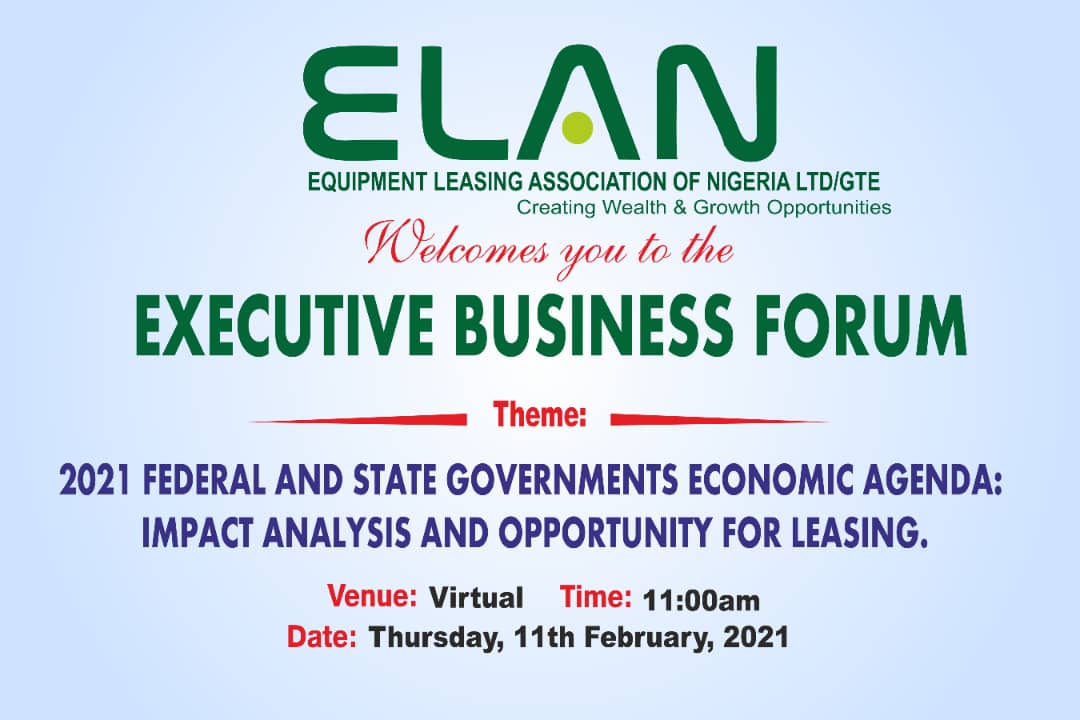
WELCOME ADDRESS BY DR. OLUTOYIN OKEOWO, CHAIRMAN, BOARD OF DIRECTORS, EQUIPMENT LEASING ASSOCIATION OF NIGERIA (ELAN), AT THE EXECUTIVE BUSINESS FORUM HELD VIRTUALLY ON THURSDAY, 11TH FEBRUARY, 2021.
Esteemed Guest Speaker and Panelists
Directors and Members of ELAN
Gentlemen of the Press
Ladies and Gentlemen,
I am delighted to welcome you on behalf of the Equipment Leasing Association of Nigeria, to our first Business Forum of the year. I am particularly honoured to welcome our highly esteemed Guest Speaker, Professor Akpan Hogan Ekpo FNES, Chairman of the Foundation for Economic Research and Training, distinguished panelists and other dignitaries. We express our most sincere gratitude to you for creating time to honour our invitation in spite of your very busy schedules.
The Business Forum is organised in furtherance of our objectives of propagating the ideals of equipment leasing and to provide a platform for cross-pollination of ideas for the development of the leasing industry. It is also intended to provide a” face time” to enhance membership engagement and bonding. The focus of this forum, is on the Federal and State Governments policy direction, as contained in their respective budgets and policy pronouncements to be discussed under the topic: 2021 FEDERAL AND STATE GOVERNMENTS ECONOMIC AGENDA: IMPACT ANALYSIS AND OPPORTUNITIES FOR LEASING. This topic is necessitated by the need for the leasing industry to analyse Government policies and key into the value driven business opportunities, that would enhance our organisational growth prospect and the industry’s contributions to national economic development, especially at this challenging time.
The 2021 agenda of the government – both Federal and states, has been set in the context of the global pandemic that has not only claimed over 2.1 million lives globally, but also caused economic crisis. The global response to the disruption, has seen several countries providing large-scale macroeconomic support to alleviate the economic blow, which has contributed to stabilisation in financial markets. Central banks in advanced economies cut policy rates and had taken other far-reaching steps to provide liquidity and to maintain investors’ confidence. In many Emerging Market and Developing Economies (EMDEs), central banks have also eased monetary policy.
In Nigeria, the blazing tsunami has equally hit very hard. Policymakers continue to face formidable challenges as they seek to contain the devastating health, macroeconomic, and social effects of the pandemic. The nation is weighed heavily with structurally weak economy affected by externally-induced shock as the economy slipped into a recession in the third quarter of 2020, following a GDP contraction of -3.62% and the negative growth of -6.1 percent recorded in the second quarter (Q2), contracting by levels not seen since the 1980s.
The Federal and State Governments supported by the private sector, have taken several palliative measures to reduce the impact of the pandemic on the people and businesses. The Federal Government for instance, developed the Nigeria Economic Sustainability Plan (NESP) involving a stimulus package of N2.3trillion in response to the health and economic emergencies. Under the plan, the key projects focusing on mass agriculture, public works and road construction, support for MSMES and digital technology etc. are expected to sustain economic activity, boost production, create jobs and save foreign exchange.
Part of the stimulus package, is being implemented by the Central Bank of Nigeria (CBN). The Apex bank, had earlier announced the provision of N1.1trillion in loans to boost local production and manufacturing across critical sectors; one-year extension of moratorium on principal repayment on CBN intervention facilities; reduction on interest and intervention loans from 9% to 5%. The package also includes, N50 billion targeted credit facilities for households and Small and Medium Enterprises (SMEs); N100 billion Healthcare loans to pharmaceutical companies, healthcare practitioners to expand capacity and the temporary and time-limited restructuring of tenor and loan terms for businesses affected by the pandemic.
Essentially, Government focus will continue to be on its economic recovery plans in response to the prevailing challenges. For instance, the 2021 budget tagged ‘Budget of Economic Recovery & Resilience’ is expected to accelerate the pace of Nigeria’s economic recovery, promote economic diversification, enhance competitiveness and ensure social inclusion. The appropriation Bill of N13.58 trillion was signed alongside Finance Bill 2020 on the last day of 2020 in line with the promise of Government to return the nation to the January to December budget cycle. The non-debt recurrent expenditure of ₦5.65 trillion, seeks to ensure the continued payment of salaries and overheads in the public sector, while the capital expenditure of N4.12trillion, indicates new focus of government’s intention to complete as many ongoing projects as possible, rather than the commencement of new projects. These level of expenditure, if implemented will stimulate activities in the economy.
Government re-echoes its focus for the year to continue to deliver on key strategic priorities under “SEA” (Security, Economy and Anti – Corruption) agenda. Some of the key priority areas include: re-energising and re-organising the security apparatus and focus on revamping the economy through the National Economic Diversification Agenda that supports the primary goal of national food self – sufficiency; rebuilding of national infrastructure base including rail systems, roads, airports and sea ports; sustaining power sector reforms, interventions to boost job creation and support the entrepreneurial drive of youths as well as sustaining the anti-corruption crusade.
However, accelerating the pace of economic recovery requires fiscal and monetary authorities to promote growth-enhancing and confidence-building policies, that would attract private capital to the economy. Essentially, this will involve sustaining and deepening policy reforms and real commitment in implementing these reforms that will boost output and put the nation on a path of macroeconomic stability. It is also essential for government in the recovery of growth plan, to expand its engagement with relevant stakeholders, particularly in the private sector to include more sectors. Government at all levels must seek innovative and proactive ways to achieving it development – oriented initiatives. One of these options is Equipment Leasing – a creative financing alternative utilised globally to stimulate economic development and growth. The appeal of leasing is underscored in its developmental attributes of enhancing capital formation in the economy, that drives job creation, revenue, better life and economic growth.
Indeed, rebuilding the economy requires enormous capital and the growing cost of assets generally presents immense opportunity for leasing as an alternative option. Asides, the emergence of opportunities in health care, ICT, logistics etc as a fallout of the pandemic, the Federal government’s intervention programmes and investment in priority areas – infrastructure, power, food security, works and housing, job creation etc, to drive economic recovery, provide ample business prospects for the leasing industry. The various States like Lagos, are equally embarking on investment on infrastructure and youth empowerment schemes as contained in their budget, which lessors can key into.
However, for us as an industry, we must position ourselves to play actively and cash in on these opportunities as they evolve. It is imperative for the leasing industry to enhance its capacity and remain resilient in the face of growing uncertainty to navigate through the storm, stay afloat and take advantage of opportunities as it continues to contribute to economic development. The realignment of strategies and adoption of innovative approach is required in this regard. This will involve thorough understanding of the impact of the emerging scenario, while maintaining a win – win posture in addressing the challenges. It would for instance, require building strategic alliance within and outside the industry to enhance capacity. The individualistic approach in the industry is limiting. Lessors for example, can pool resources together under a syndicated lease arrangement to scale up and enhance participation in some of the major opportunities and mitigate associated risks.
While the relevance of leasing to economic development and the need for the industry to enhance its capacity to fill the financing gab in the economy are not in doubt, it is imperative for all stakeholders to continue to support the development of the industry .Government as a major stakeholder can facilitate the creation of appropriate funding mechanism for leasing, for instance, through access to intervention funds and inaugurate the Equipment Leasing Registration Authority to give full effect to the Equipment Leasing Act 2015. These and other specific interventions, will further take the industry nearer to its destination of contributing more to capital formation in the Nigerian economy.
ELAN as the umbrella body for the leasing industry, will continue to guide and create the platform that would facilitate the attainment of corporate objectives and the diverse interest of stakeholders.
Distinguished Ladies and Gentlemen, I am excited that this forum will take a deeper analysis of these issues and particularly so with the experience of our Guest Speaker, discussants and the quality of participation. At the end of the day, we expect to come out with key resolutions that would set the stage for further engagement to create value for members and indeed the entire economy.
On behalf of ELAN, I welcome you once again to the Executive Business Forum and I wish us fruitful deliberations.
Thank you.
OLUTOYIN OKEOWO
CHAIRMAN, BOARD OF DIRECTORS, ELAN

